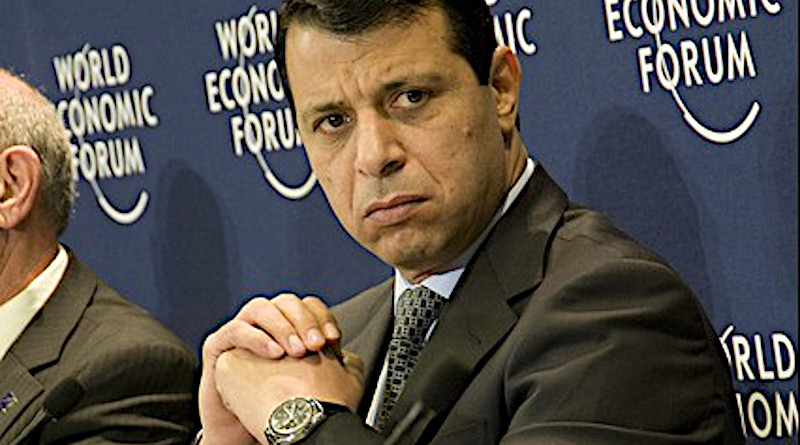Dahlan Plays The Long Game – OpEd
The forthcoming Palestinian elections have generated a good deal of speculation. Among the many players, one rather enigmatic figure is Mohammed Dahlan. Long believed to harbor the ambition of succeeding Mahmoud Abbas as president of the Palestinian Authority, he is currently facing a political dilemma.
“Dahlan is a convicted criminal,” said a PA official recently, “and as such he won’t be allowed to participate in the elections. If he enters Ramallah, he will be immediately arrested and thrown into prison.”
Long viewed by Abbas as a major adversary and rival, a series of personal disputes led the PA president to revoke Dahlan’s parliamentary immunity, opening the way to his being tried in absentia by a Palestinian court for embezzlement. Found guilty in December 2016, he was sentenced to three years in jail and expelled from the Fatah party. Abbas then openly accused him of being involved in the murder of former PA president Yasser Arafat. Dahlan denied all the charges.
Dahlan’s past is replete with rumors of political maneuverings and conspiratorial plots (the Turkish government has a warrant out for his arrest, on a charge of plotting the anti-Erdogan coup of 2016). Now he seems to have devised a characteristically convoluted strategy to achieve his political ambitions.
Thirty-six parties have submitted lists for the upcoming parliamentary and legislative elections. Hamas is running as one united list, but Fatah has split into three. Its main list is led by Abbas, another is led jointly by Marwan Barghouti (currently serving five life sentences in Israeli prison) and Nasser al-Qudwa (who has been expelled from Fatah); and a third list is led by Dahlan. Neither Barghouti nor Dahlan are themselves running for parliament.
The Palestinian Central Elections Commission (CEC) had the task of either approving or banning the lists. The rules governing its decisions are obscure, not to say arbitrary. It was, therefore, far from certain that Dahlan’s party would be permitted to participate at all in the elections. In the event, the CEC has allowed them to do so.
It was back in 2011 thatDahlan was driven out of the West Bank after a row with Abbas. He took up residence in the United Arab Emirates (UAE), and is an adviser to the crown prince, Mohammed bin Zayed al Nahyan. It is widely speculated that he played a key role in bringing the UAE-Israel normalization deal to fruition. Palestinian officials are quoted as saying they have no doubt about it.
Dahlan opened his campaign on March 17 with an interview on Al-Arabiya TV.
“Abbas made three promises,” he said. “To reform and strengthen Fatah, to reform the Palestinian Authority, which he said at the time was corrupt… and to make an honorable peace [with Israel]. He did none of them.”
Dahlan maintained that Hamas and Fatah were conspiring to allow the 85-year-old Abbas to run unopposed in the forthcoming presidential election, “…as if he were 40 years old and his future was ahead of him.”.
Without elaborating as to whether he would run himself, Dahlan declared enigmatically: “Abbas will not be the only presidential candidate in the elections.”
Although Dahlan’s participation in the forthcoming Palestinian Legislative Council election virtually turned on the toss of a coin, Jerusalem Post political commentator Khaled Abu Toameh believes he is hoping that his supporters will win enough seats to allow them to be part of a future government coalition. Once Dahlan loyalists are in the parliament and government, Abu Toameh believes, the plan will be for them to negotiate their leader’s participation in the presidential election, scheduled for July 31.
If this is indeed Dahlan’s strategy, its outcome is highly unpredictable. He might, in fact, be playing a longer, more subtle game. Assuming the reported Hamas-Fatah deal holds, and Abbas is indeed returned as PA president for a further four years, by 2025 – if he survives – Abbas will be pushing 90. By then Dahlan, at 63, would have had time and opportunity to consolidate and strengthen his support among the Palestinian population – a process he has already begun by arranging delivery of tens of thousands of the Russian Sputnik V Covid vaccine to Gaza, courtesy of his UAE patron.
He is also promising a swift solution of the endemic problem of inadequate electricity supplies in the Gaza strip.
“One of my business associates could resolve it easily,” said Dahlan in his TV interview. “This isn’t such a big deal. We’re not talking about some enormous grant. It is the political divides and personal rifts that have – and I’m sorry to put it like this – turned the Palestinian people into beggars.”
A more covert move at strengthening his influence within the Palestinian political scene has been the deal Dahlan is reported to have struck with Hamas. Under its terms Dahlan apparently agreed to pay blood money to the families of dozens of Palestinians killed by his men in the past three decades, in return for which his supporters would be permitted to return to the Gaza Strip. And indeed in the past few weeks scores of Dahlan loyalists began returning under assurances from Hamas that they would not be arrested or killed.
In the long term the real significance of these Palestinian elections may be that Mohammed Dahlan, after years of exile in the UAE, is making a formal return to the political scene.

